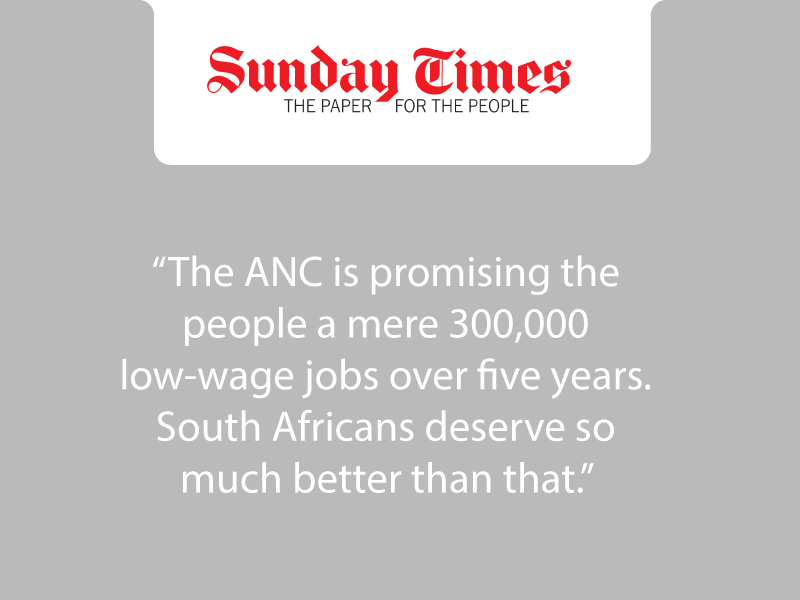
EVERYONE wants growth, but no one wants change.” — Prof Paul Romer. A new growth agenda will need to be shaped by some broad guidelines for reform and it will work best if centred on a limited number of essential priorities.
The first guideline is that government must place growth and employment at the top of its policy agenda. Growth and employment must become the criteria by which the consequences — intended and unintended — of all other policy initiatives should be assessed.
A second is that we should play to our strengths. Relative to many developing countries, SA has a number of important advantages. These include: the size, strength and productivity per worker of many firms; our Constitution and the independence of our judiciary; credibility and integrity of some key public institutions charged with management of the economy; and several large cities with considerable potential for economic dynamism, not just one overwhelmingly dominant capital city as in many other developing countries. Decisive changes to key policies could allow us to leverage these strengths and reverse some of the recent declines quickly.
Complex societies facing many challenges cannot fix everything at once. The National Development Plan (NDP) is a valuable national resource. However, at nearly 500 pages in 15 chapters, each with its own set of priorities and recommendations, it is a compendium of ideas rather than a call to action. Our third guideline, therefore, is that the country needs a more focused set of catalytic priorities.
These guidelines helped shape the seven reports released last week by the Centre for Development and Enterprise (CDE) as part of its growth agenda. The reports spell out, with practical recommendations, the priority areas in which reforms are required to achieve higher and more inclusive growth.
Here we briefly summarise the key areas in which reform must occur.
• Transformation and growth must work together for all South Africans. Without transformation in the distribution of assets, skills, incomes and opportunities for millions, we will not have the kind of growth that brings broad-based prosperity and security for all.
However, without growth, transformation will degenerate into a zero-sum contest for limited opportunities in a stagnating economy. Rebalancing the current approach to transformation away from elite enrichment to growth-driven inclusion and empowerment so that it supports rather than undermines growth prospects, is one of SA’s most urgent priorities.
• The country needs one credible new strategy for inclusive growth. Too many people still see the state as the job creator of last resort. However, the fiscal space for this has closed completely. Central to a new growth strategy must be recognition that faster growth is possible only if new businesses are able to start up and existing firms can expand. From energy- and infrastructure delivery to housing, transport, schooling and healthcare, appropriately regulated, but liberalised markets can deliver widely and cost-effectively. Competition is good for growth; it should apply across the entire economy.
• States and markets: State-led development is failing in SA, its costs no longer masked by the commodity boom. The state has become increasingly intrusive even as it has become more ineffective and corrupt. An effective state that understands competitive markets, rather than one that has special relationships with selected businesses (cronies) is vital, but this needs more than the professional public service envisaged by the NDP. Policy makers and officials need a much greater appreciation of the ability of firms and markets to drive growth. Unlocking private sector growth is the only way to attain national development goals.
• SA needs jobs for the workforce we have, not the one we wish we had. Labour legislation and the “decent jobs” doctrine hold back employment. Unacceptably high levels of unemployment, poverty and inequality are the visible testimony to the failure of this approach. Expanding employment options to include industries that use lots of unskilled labour is a precondition for improving the prospects of the poor. A low wage is better than no wage at all. These sectors have been undermined by labour market policies that have raised the cost of employment and created a structural bias towards higher wages. Since employers cannot know where these costs will be in the future, they have become reluctant to hire. Reforms to the wage-setting institutions are needed to rebalance this relationship and facilitate employment growth.
•Growth requires a reset of the state-business relationship. SA will not succeed if government is pro-growth, but anti-business. Repairing the dysfunctional relationship between business and government will not be achieved through grand summits or semi-secret crisis conclaves. SA’s business environment has been shaped in large part by government’s deeply held suspicion that pursuit of profit must always lead to harmful social and developmental consequences. This attitude denies the truth about growth; it is firms subjected to competitive pressures that drive societies’ increasing prosperity. If, as the government professes, it wants growth and it believes the private sector should invest and create jobs, then it cannot shirk the responsibility of defending markets, in particular, to its own supporters.
However, responsibility for improving the relationship between business and government, state and market, is not the government’s alone. Business leaders have approached engagement with the state and wider society in a new democracy ineffectively. Business needs to devote resources to developing policy proposals on national issues and participate more effectively in debate on the role of business in society.
• Skills are vital at every point in the growth agenda. SA has 3.4-million people aged 15-24 not in “education, employment or training”. If we do not improve the quality of technical and vocational training, we risk repeating the mistakes of basic education — expanded access, but very poor quality output. The skills pipeline has to be reformed and until this bears results, we need to recruit foreign skills in greater numbers.
• SA’s future is urban. Policies, power and resources must now realise this. The economic potential of SA’s cities must be central to the new growth strategy. SA needs to end its ambivalence about urbanisation. Cities need additional powers, along with greater accountability to residents. We need new housing and urban-transport policies.
The bottom line: SA needs growth that is urban-led, private sector-driven, enabled by a smart state that understands markets and targeted at mass employment. If we make the right choices, the lives of the majority of South Africans could change for the better in a generation.
• Bernstein is executive director of the Centre for Development and Enterprise and author of the award-winning book, The Case for Business in Developing Economies




